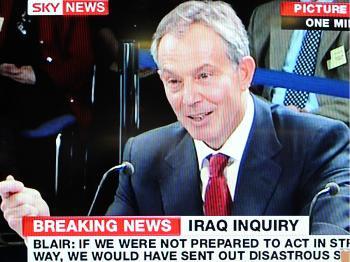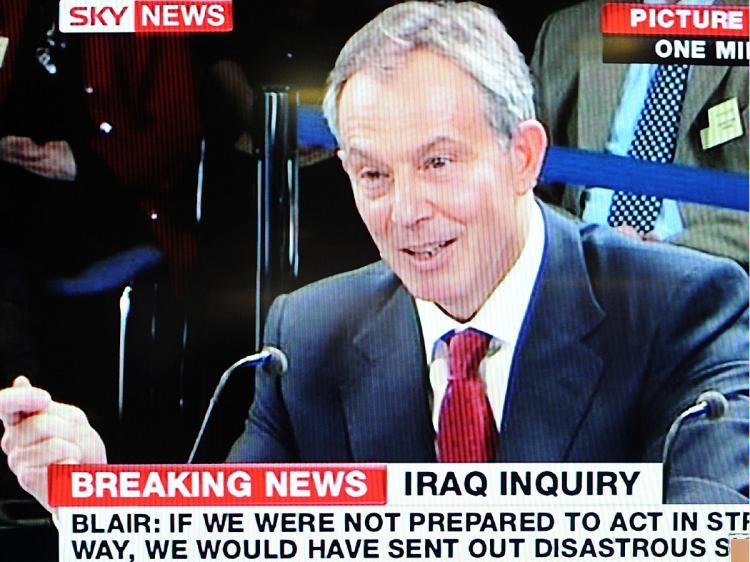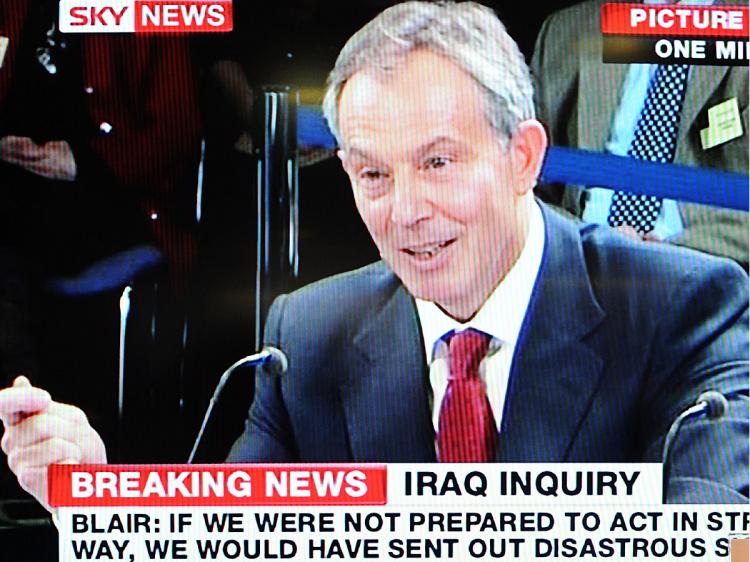LONDON-Tony Blair flatly denied that he had ‘signed a deal in blood’ in a secret meeting with George Bush agreeing to invade Iraq over a year ahead of the invasion in 2003.
Speaking to the Iraq Inquiry in a much-anticipated appearance broadcast live on the web and television, the former prime minister stoutly defended his decision to invade Iraq.
He stood by the ‘dodgy dossier’ on weapons of mass destruction (WMD), saying that he believed “beyond all doubt” that intelligence showed the existence of the WMD—which were never found.
The Iraq Inquiry, convened by British Prime Minister Gordon Brown, was officially launched on 30 July 2009 to identify lessons that can be learned from the Iraq conflict.
Sitting with his back to an audience which included relatives of those killed in action in Iraq, Mr. Blair emphasized throughout his testimony that many issues were a judgment call and stressed that 9/11 had completely changed the perception of risk from Saddam’s regime.
“This isn’t about a lie or a conspiracy or a deceit or a deception.
“It’s a decision. And the decision I had to take was, given Saddam’s history, given his use of chemical weapons, given the over one million people whose deaths he had caused, given 10 years of breaking UN resolutions, could we take the risk of this man reconstituting his weapons programs or is that a risk that it would be irresponsible to take?” said Mr. Blair.
Sometimes it is important not to ask the “March 2003 question” but the “2010 question”, said Mr. Blair, saying that if Saddam had not been toppled at the time the allies would have “lost our nerve” to act.
Mr. Blair sought on several occasions to challenge what he saw was a “binary distinction” created by the Inquiry between regime change and disarmament, saying that the two issues were inseparable.
“The truth of the matter is that a regime that is brutal and oppressive - that for example, has used weapons of mass destruction against its own people, as Saddam did, and had killed tens of thousands of people by the use of chemical weapons. Such a regime is a bigger threat if it has weapons of mass destruction than one that is otherwise benign.”
Mr. Blair tried to brush aside much-quoted remarks made in an recent interview on Fern Britain in which he appeared to say that he favored regime change and would have invaded Iraq even if there had been no WMD.
He suggested he had made an error of communication in the interview and said he had not shifted his stance that the basis for war was Iraq’s failure to comply with its obligations to disarm.
“I did not use the words regime change in that interview. It was the breach of the U.N. resolutions on WMD, that was the cause. It was then and it remains.”
Speaking to the Iraq Inquiry in a much-anticipated appearance broadcast live on the web and television, the former prime minister stoutly defended his decision to invade Iraq.
He stood by the ‘dodgy dossier’ on weapons of mass destruction (WMD), saying that he believed “beyond all doubt” that intelligence showed the existence of the WMD—which were never found.
The Iraq Inquiry, convened by British Prime Minister Gordon Brown, was officially launched on 30 July 2009 to identify lessons that can be learned from the Iraq conflict.
Sitting with his back to an audience which included relatives of those killed in action in Iraq, Mr. Blair emphasized throughout his testimony that many issues were a judgment call and stressed that 9/11 had completely changed the perception of risk from Saddam’s regime.
“This isn’t about a lie or a conspiracy or a deceit or a deception.
“It’s a decision. And the decision I had to take was, given Saddam’s history, given his use of chemical weapons, given the over one million people whose deaths he had caused, given 10 years of breaking UN resolutions, could we take the risk of this man reconstituting his weapons programs or is that a risk that it would be irresponsible to take?” said Mr. Blair.
Sometimes it is important not to ask the “March 2003 question” but the “2010 question”, said Mr. Blair, saying that if Saddam had not been toppled at the time the allies would have “lost our nerve” to act.
Mr. Blair sought on several occasions to challenge what he saw was a “binary distinction” created by the Inquiry between regime change and disarmament, saying that the two issues were inseparable.
“The truth of the matter is that a regime that is brutal and oppressive - that for example, has used weapons of mass destruction against its own people, as Saddam did, and had killed tens of thousands of people by the use of chemical weapons. Such a regime is a bigger threat if it has weapons of mass destruction than one that is otherwise benign.”
Mr. Blair tried to brush aside much-quoted remarks made in an recent interview on Fern Britain in which he appeared to say that he favored regime change and would have invaded Iraq even if there had been no WMD.
He suggested he had made an error of communication in the interview and said he had not shifted his stance that the basis for war was Iraq’s failure to comply with its obligations to disarm.
“I did not use the words regime change in that interview. It was the breach of the U.N. resolutions on WMD, that was the cause. It was then and it remains.”







